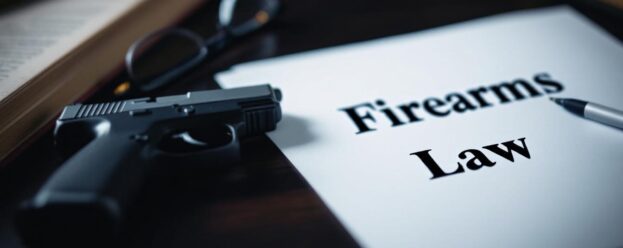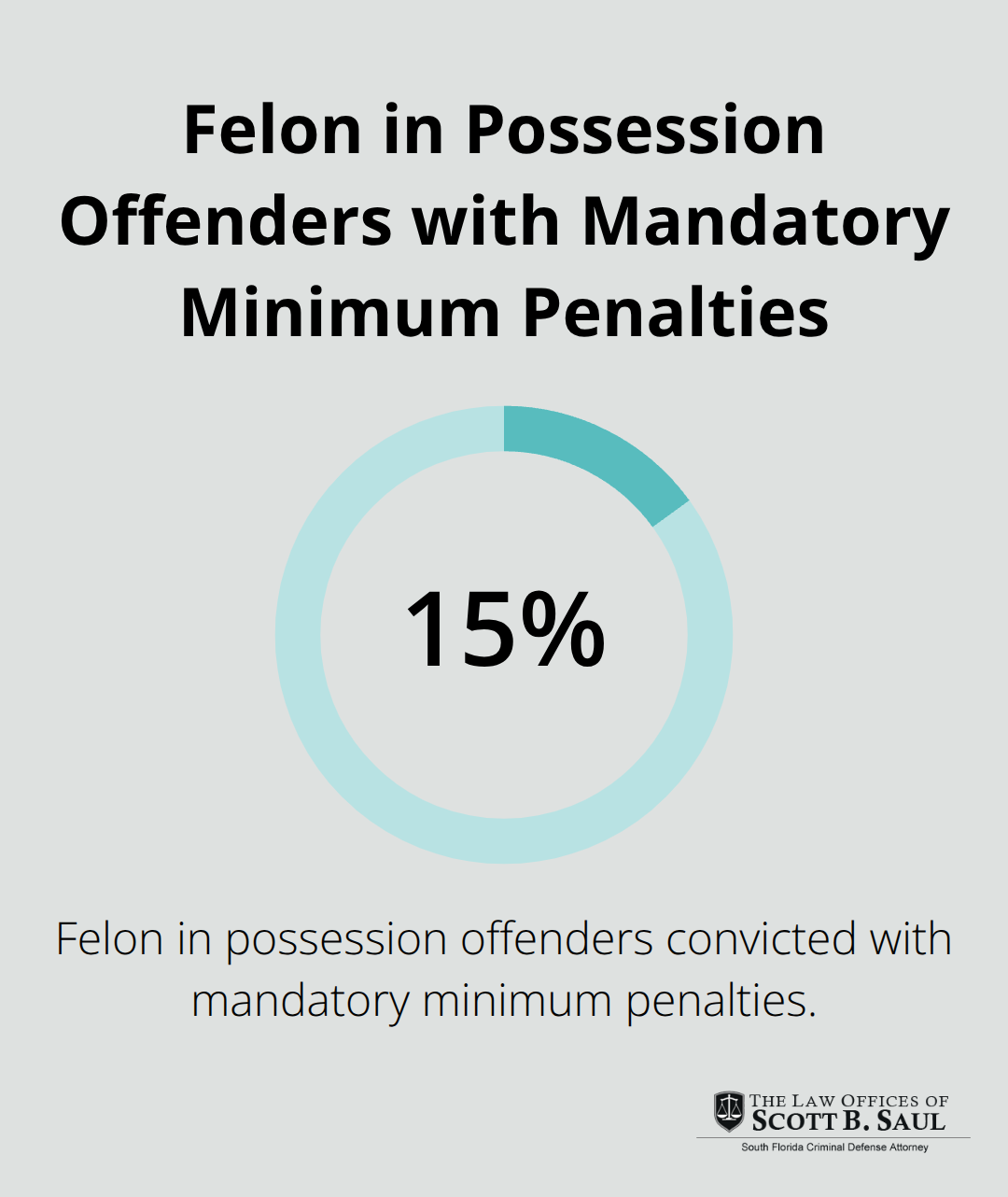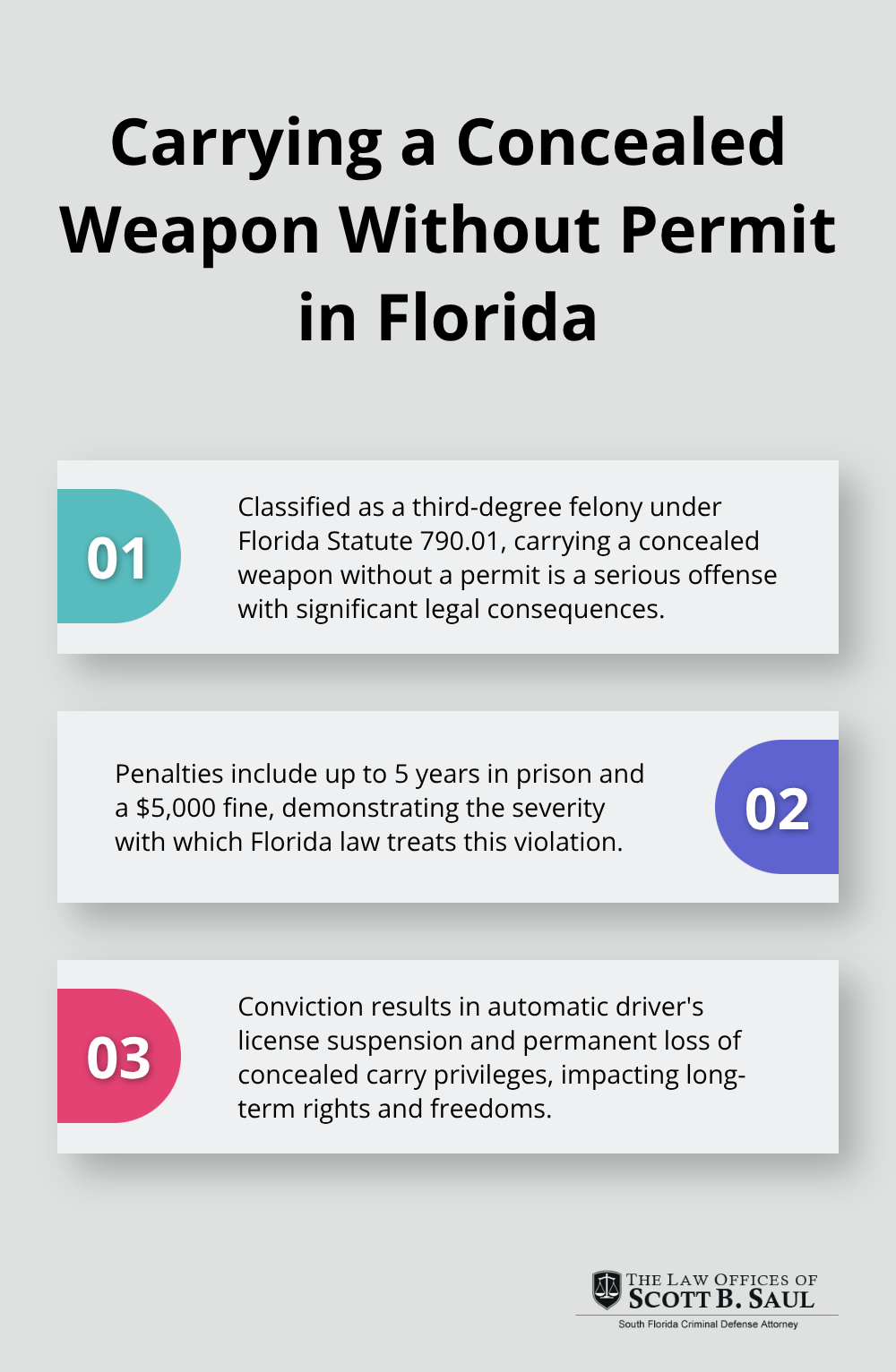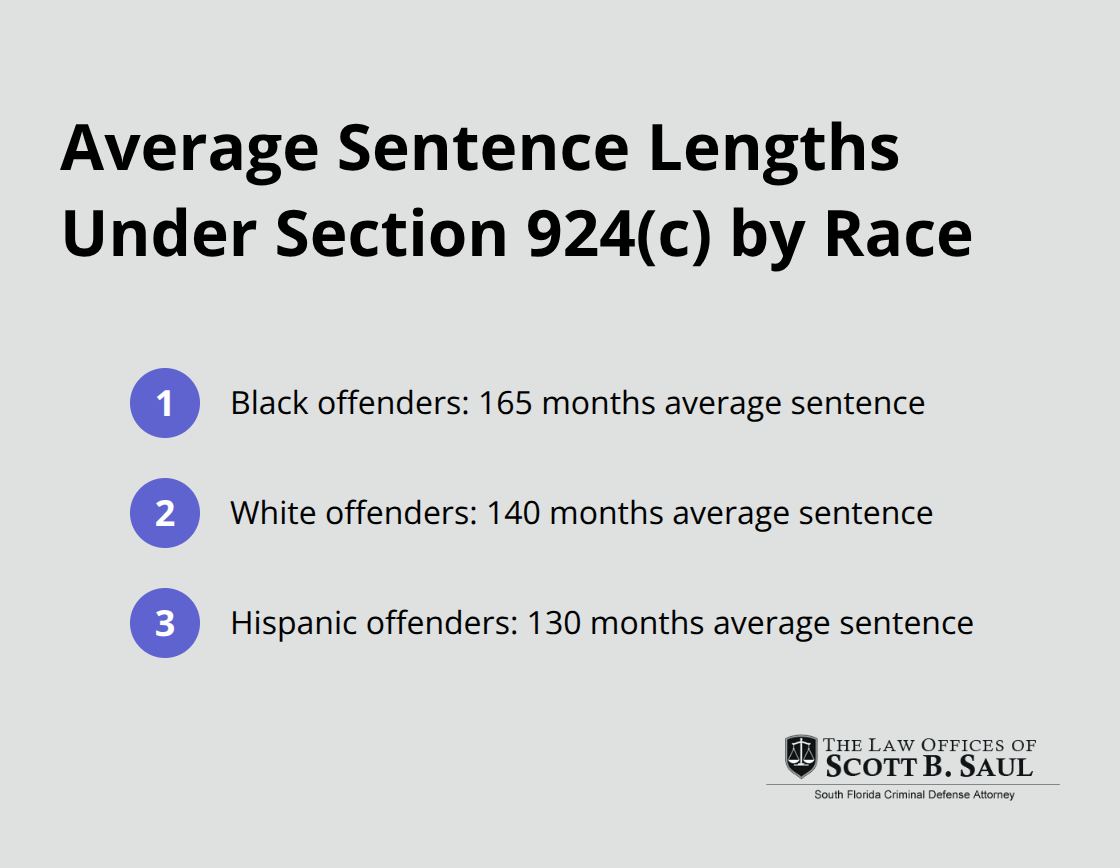What’s the Penalty for Illegal Gun Possession?
By : saulcrim | Category : Criminal Defense | Comments Off on What’s the Penalty for Illegal Gun Possession?
18th Sep 2025

Illegal gun possession carries severe penalties that can change your life forever. Federal charges alone can result in up to 10 years in prison, while Florida state laws add their own harsh consequences.
We at Law Offices of Scott B. Saul see clients facing these charges regularly. Understanding what is the penalty for illegal gun possession helps you grasp the serious nature of these offenses and why immediate legal action matters.
Federal Penalties for Illegal Gun Possession
Federal gun possession charges impose mandatory minimum sentences that strip judges of discretion. Under 18 USC 922(g), convicted felons face up to 10 years in federal prison for firearm possession, with demographic differences in sentencing patterns documented by the U.S. Sentencing Commission. The Armed Career Criminal Act creates even harsher penalties, with offenders averaging over 15 years in prison according to 2016 data. Federal prosecutors frequently stack charges under section 924(c), where defendants with multiple counts receive average sentences that exceed 27 years.
Felon in Possession of a Firearm Charges
Federal law targets convicted felons who possess firearms with severe consequences. The U.S. Sentencing Commission found that 15.6% of felon in possession of a firearm offenders were convicted of one or more statutes with a mandatory minimum penalty. Courts sentence defendants with criminal histories to terms averaging 33 months longer than first-time offenders. The statistics reveal that 85.5% of section 924(c) offenders also face conviction for another crime, which leads to significantly longer sentences averaging 159 months compared to 99 months for standalone firearm charges.

Penalties for Prohibited Persons Under Federal Law
Federal law prohibits specific categories of people from possessing firearms, including those with domestic violence convictions, drug users, and individuals subject to restraining orders. These restrictions apply automatically without exception (18 USC 922(g)). Courts impose prison sentences on prohibited persons who violate these laws, with little room for alternative penalties. The mandatory nature of these penalties means that conviction almost guarantees significant prison time.
Enhanced Sentences for Repeat Offenders
Repeat firearm offenders face devastating consequences under federal sentencing guidelines. The data shows defendants charged with multiple section 924(c) counts who received prosecutorial relief still averaged 136 months in prison, while those without relief faced 431 months. Federal courts rarely allow concurrent sentences, which means each charge adds years to the total prison term. Weapons enhancements can add a decade to sentences (particularly for automatic weapons), making federal prosecution far more severe than state charges. Florida state laws present their own complex penalty structure that operates alongside these federal consequences.
Florida State Penalties for Illegal Gun Possession
Florida state penalties for illegal gun possession create a parallel punishment system that operates independently from federal charges. Carrying a concealed weapon without a permit constitutes a third-degree felony under Florida Statute 790.01, punishable by up to five years in prison and a $5,000 fine. The state imposes automatic license suspension and permanent loss of concealed carry privileges for violations. Florida courts sentence most offenders to probation for first-time violations, but prior convictions trigger mandatory minimum sentences that judges cannot reduce.
Carrying a Concealed Weapon Without a Permit
Florida law treats unlicensed concealed carry as a serious felony offense with immediate consequences. First-time violators face up to five years in state prison, though courts typically impose probation terms with strict conditions. The state automatically suspends driver’s licenses for gun violations (even unrelated to vehicles), and defendants lose their right to apply for concealed carry permits permanently. Florida prosecutors file these charges aggressively, with conviction rates that exceed 90% in most counties.

Possession by Convicted Felons Under Florida Law
Florida Statute 790.23 prohibits convicted felons from possessing firearms with mandatory three-year minimum sentences that cannot be suspended or reduced. The state’s 10-20-Life law imposes mandatory minimum sentences based on how the firearm was used during the commission of a felony. Florida prosecutors pursue these enhancements relentlessly, with conviction rates that exceed 85% according to state court statistics. The law applies retroactively to prior out-of-state convictions, which catches many defendants unprepared.
Minimum Mandatory Sentences and Enhanced Penalties
Florida’s habitual offender statutes multiply sentences for repeat gun possession violations dramatically. Third-time felony offenders face potential life sentences under the state’s three-strikes law, while habitual violent felony offenders receive mandatory life terms without parole eligibility. The state’s point system adds penalties for each prior conviction, weapon use, and victim injury, which creates sentences that often exceed federal penalties. Florida courts rarely grant downward departures in gun cases, and judges must impose these harsh sentences regardless of individual circumstances.
These state penalties work alongside federal charges, and defendants often face prosecution in both systems simultaneously, which creates complex legal challenges that require immediate attention.
What Determines Your Sentence Length
Courts weigh multiple factors when they impose sentences for illegal gun possession, and these variables can mean the difference between probation and decades in prison. Prior criminal history creates the most dramatic impact on outcomes, with defendants with criminal records receiving significantly longer sentences than first-time offenders. Black offenders face longer average sentences of 165 months under section 924(c) compared to White offenders at 140 months and Hispanic offenders at 130 months, which reveals troubling disparities in the justice system. The type of weapon seized also determines penalty severity, with automatic weapons that add 10 years to sentences under federal enhancement provisions.

Criminal History Impact on Penalties
Your past convictions multiply current penalties exponentially through habitual offender laws and federal enhancement statutes. Repeat firearms offenders under the Armed Career Criminal Act face significantly longer prison terms, while first-time offenders typically receive shorter terms. Florida’s point system adds penalties for each prior conviction, which creates cumulative effects that often surprise defendants who underestimate their exposure.
Courts examine the nature and timing of previous offenses, with violent crimes and drug trafficking convictions that carry more weight than property offenses. Federal judges consider criminal history categories that can double or triple recommended sentence ranges (making your record the single most important factor in determining punishment).
Weapon Type and Possession Circumstances
The specific firearm involved and circumstances of possession directly influence sentence severity in ways most people never anticipate. Possession of stolen firearms triggers additional federal charges regardless of whether you stole the weapon, while modified weapons or those with obliterated serial numbers face enhanced penalties. Courts impose harsher sentences for possession in prohibited locations like schools or federal buildings, with the Gun-Free School Zones Act that adds five years to federal sentences.
The manner of discovery matters significantly, as weapons found during drug transactions or violent crimes receive treatment as tools of criminal enterprise rather than simple possession cases. Federal prosecutors examine every detail of how and where authorities discovered the firearm to build enhancement arguments.
Prosecution Strategy and Plea Negotiations
Federal prosecutors use stacked charges under section 924(c) to force plea agreements, with defendants who face multiple counts receiving average sentences that exceed 27 years if convicted at trial. The U.S. Sentencing Commission found that less than 1% of federal gun defendants proceed to trial, with those who do receive sentences over double those who plead guilty. Substantial assistance cooperation can reduce sentences dramatically, with section 924(c) defendants who provide government assistance averaging 95 months compared to 166 months for non-cooperators.
Florida prosecutors pursue habitual offender enhancements aggressively, and defendants must negotiate these potential life sentences before charges are filed to avoid devastating consequences. The timing of plea negotiations often determines whether prosecutors will agree to drop enhancement charges or recommend downward departures from mandatory minimums.
Final Thoughts
Illegal gun possession penalties destroy lives and require immediate legal action. Federal charges under 18 USC 922(g) impose up to 10 years in prison, while Florida state violations add concurrent penalties that include mandatory minimums and permanent rights restrictions. The Armed Career Criminal Act pushes sentences beyond 15 years for repeat offenders, and section 924(c) violations average over 27 years when multiple counts apply.
Professional defense becomes essential when you understand what is the penalty for illegal gun possession. Federal prosecutors stack charges aggressively, with less than 1% of defendants who proceed to trial due to devastating potential sentences. Florida’s habitual offender laws create life sentence exposure for third-time felons, while the state’s 10-20-Life statute adds mandatory minimums based on weapon use circumstances (making immediate legal consultation vital for protection).
We at Law Offices of Scott B. Saul provide aggressive representation for clients who face federal and state gun charges throughout South Florida. Our firm has successfully defended clients in complex firearms cases and understands the intricate strategies prosecutors use to maximize sentences. Contact our experienced criminal defense team immediately if you face gun possession charges to protect your rights and explore all available defense options.
Archives
- October 2025 (3)
- September 2025 (9)
- August 2025 (8)
- July 2025 (8)
- June 2025 (9)
- May 2025 (9)
- April 2025 (8)
- March 2025 (9)
- February 2025 (8)
- January 2025 (9)
- December 2024 (10)
- November 2024 (5)
- July 2024 (2)
- June 2024 (2)
- May 2024 (2)
- April 2024 (2)
- March 2024 (2)
- February 2024 (2)
- January 2024 (2)
- December 2023 (2)
- November 2023 (2)
- October 2023 (2)
- September 2023 (2)
- August 2023 (1)
- July 2023 (2)
- June 2023 (2)
- May 2023 (2)
- April 2023 (2)
- March 2023 (2)
- February 2023 (2)
- January 2023 (2)
- December 2022 (2)
- November 2022 (2)
- October 2022 (2)
- September 2022 (2)
- August 2022 (2)
- July 2022 (2)
- June 2022 (2)
- May 2022 (2)
- April 2022 (2)
- March 2022 (2)
- February 2022 (2)
- January 2022 (2)
- December 2021 (2)
- November 2021 (2)
- October 2021 (2)
- September 2021 (2)
- August 2021 (2)
- July 2021 (2)
- June 2021 (2)
- May 2021 (2)
- April 2021 (2)
- September 2020 (5)
- July 2020 (4)
- June 2020 (4)
- May 2020 (4)
- April 2020 (5)
- March 2020 (4)
- February 2020 (4)
- January 2020 (4)
- December 2019 (1)
- November 2019 (4)
- October 2019 (4)
- September 2019 (4)
- August 2019 (4)
- July 2019 (5)
- June 2019 (4)
- May 2019 (4)
- April 2019 (4)
- March 2019 (4)
- February 2019 (4)
- January 2019 (4)
- December 2018 (4)
- November 2018 (5)
- October 2018 (5)
- September 2018 (4)
- August 2018 (4)
- July 2018 (7)
- June 2018 (4)
- May 2018 (4)
- April 2018 (8)
- March 2018 (4)
- February 2018 (4)
- January 2018 (4)
- November 2017 (4)
- October 2017 (4)
- September 2017 (4)
- August 2017 (7)
- July 2017 (6)
- June 2017 (4)
- May 2017 (4)
- April 2017 (4)
- March 2017 (4)
- February 2017 (7)
- January 2017 (4)
- December 2016 (7)
- November 2016 (4)
- October 2016 (4)
- September 2016 (10)
- August 2016 (4)
- July 2016 (4)
- June 2016 (4)
- May 2016 (4)
- April 2016 (4)
- March 2016 (4)
- February 2016 (7)
- January 2016 (4)
- December 2015 (5)
- November 2015 (4)
- October 2015 (7)
- September 2015 (4)
- August 2015 (4)
- July 2015 (13)
- June 2015 (9)
- May 2015 (8)
- April 2015 (6)
- March 2015 (4)
- February 2015 (4)
- January 2015 (4)
- December 2014 (4)
- November 2014 (4)
- October 2014 (4)
- September 2014 (3)
Categories
- Adjudication (1)
- Bankruptcy (1)
- Burglary Crimes (3)
- calendar call (1)
- Car Accident (1)
- Criminal Defense (359)
- Cyber Crimes (7)
- DNA (1)
- Domestic Violence (9)
- Drug Crimes (5)
- DUI (12)
- Embezzlement (1)
- Environmental Crimes (4)
- Expungement Law (2)
- Federal Sentencing Law (3)
- Firearm (3)
- Forgery (4)
- General (82)
- Healthcare (3)
- Immigration (1)
- Indentity Theft (1)
- Insurance (5)
- judicial sounding (2)
- Juvenile Crimes (4)
- Manslaughter (4)
- Money Laundering (3)
- Organized Crime (1)
- Racketeering (1)
- Reckless Driving (3)
- RICO (3)
- Sealing and Expunging (2)
- Sex Offense (1)
- Shoplifting (1)
- Suspended Driver's License (1)
- Traffic (4)
- Trending Topics (1)
- White-collar Offenses (1)

